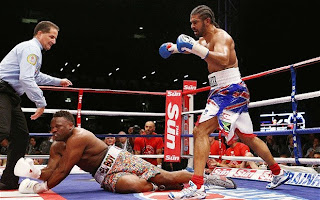 |
| The Hayemaker marks his return in emphatic style |
The returning Haye has his eyes firmly set on a meeting with Wladimir's older brother Vitali after knocking out Dereck Chisora at Upton Park on Saturday night. Khan, on the other hand, has an incredible amount of work to do to re-build his reputation in the light welterweight division, before he can even consider moving up to welterweight, following a devastating fourth-round defeat to Danny Garcia in Las Vegas.
 |
| I Khan't continue: Amir is unable to beat the referee's count |
What Khan would give to be in the same position as Haye in his respective weight class. Sadly, and rather surprisingly, he appeared to be out of his depth against the largely unfancied American Garcia. The 25-year-old was left completely exposed, just as he had been by Breidis Prescott in 2008, and was feeding his critics with an abundance of ammunition as the fight came to its conclusion in the third and fourth rounds. No chin. Tactically naive. The knives were sharpening with each and every knockdown.
IBF super-middleweight champion Carl Froch has urged Khan to call time on his career(http://www.bbc.co.uk/sport/0/boxing/18846772) but the man from Bolton has vowed to battle on and prove that he has what it takes to mix it with the very best in the business (http://www1.skysports.com/boxing/news/12183/7903727/Amir-Khan-will-continue). Whether he will now get his dream fight against Mayweather remains to be seen but there are certainly challenges for him which rank between his ultimate goal and what he has already achieved. As he has admitted though, there is no longer any margin for error.
If there's ever been such a true indication of how ruthless a sport boxing can be, then Saturday night was it. It proved how careers can be brought back to life and thrown into turmoil in one fight, in one moment, with one punch. Some may argue that Khan ought to take inspiration from Haye in the way that he has bounced back from disappointment but in reality it is going to take more than one fight for him to reignite his career. He's unlikely to receive the same sums of money he has been since embarking on America and will have to show a huge amount of hunger and inner strength to earn his place amongst the elite once more.
For Haye, it's a case of waiting and hoping that a fight with Vitali can be agreed. His antics prior to the fight with Wladimir incensed Vitali as much as they did his brother but that in itself will not justify the fight going ahead. At the age of 40, and with a career in politics in the pipeline, there are serious doubts about whether the Ukrainian really has the desire to grant Haye his wishes. Furthermore, Vitali's manager Bernd Bonte claims that Haye has twice turned down the opportunity, choosing to fight Nikolai Valuev and Chisora instead (http://www.guardian.co.uk/sport/2012/jul/16/vitali-klitschko-david-haye-fight?newsfeed=true). Ultimately, if both fighters genuinely want it to happen, it will.
So what will the next 12 months bring for Haye and Khan? As we have seen, a lot could happen in that time.

